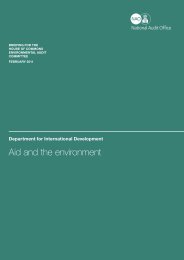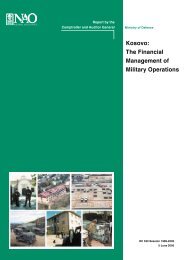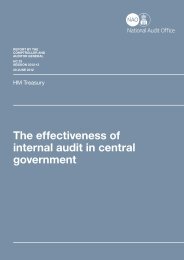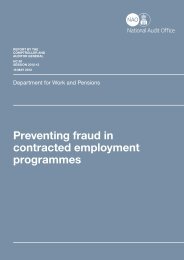Department of Health: The Paddington Health Campus Scheme
Department of Health: The Paddington Health Campus Scheme
Department of Health: The Paddington Health Campus Scheme
You also want an ePaper? Increase the reach of your titles
YUMPU automatically turns print PDFs into web optimized ePapers that Google loves.
glossary<strong>Paddington</strong> <strong>Health</strong> <strong>Campus</strong>Patient choice (at the point<strong>of</strong> referral)Payment by Results (PbR)Principals’ GroupProject Executive GroupPrivate Finance Initiative (PFI)Public Sector Comparator (PSC)RiskRisk assessmentRisk registerStrategic Outline CaseTurnberg Report 1998West London Partnership ForumWestminster City Council (WCC)the project by which the <strong>Campus</strong> Partners sought to build a health complex onthe <strong>Paddington</strong> Basin site.the policy, effective from January 2006, whereby patients are able to choose aconvenient place, date and time for their initial hospital appointment from atleast four providers.the NHS financial framework for rewarding activity in hospitals witha tariff-based payment.established in August 2004 to enable the <strong>Campus</strong> partners to negotiate effectivelyin a time-critical manner with <strong>Paddington</strong> Development Corporation Limited.established in March 2004 to take day-to-day decisions relating to the schemein conjunction with the Project Director. Reported to the Joint Project Board.a policy introduced by the Government in 1992 to harness private sectormanagement and expertise in the delivery <strong>of</strong> public services, while reducingthe impact <strong>of</strong> public borrowing.a method used to calculate the “in-house” cost <strong>of</strong> delivering a project, whichhelps determine whether the Private Finance Initiative route is a viablealternative and demonstrates good value for money.the probability <strong>of</strong> an event occurring, coupled with the anticipated impact onindividuals and/or organisations.the process that helps organisations understand the range <strong>of</strong> risks they face– both internally and externally, the level <strong>of</strong> ability to control these risks, theirlikelihood <strong>of</strong> recurrence and their potential impacts. It involves a mixture <strong>of</strong>quantifying risks and using judgement, assessing and balancing <strong>of</strong> risks andtheir benefit and weighing them, for example, against cost.a database where results <strong>of</strong> all an organisation’s risk assessments are recorded.the first phase (preceding Outline Business and Full Business) <strong>of</strong> the businesscase cycle, which makes the case for change.a review <strong>of</strong> London’s healthcare provision, chaired by Sir Leslie Turnberg,which set the context for the wider London healthcare strategy.formed in March 1999 to unite the local healthcare organisations in westLondon (now north west London) and Imperial College to take forward therecommendations <strong>of</strong> the Turnberg Report 1998. Dissolved in March 2002.local authority, which owned the North Westminster Community School Siteand was the provider <strong>of</strong> planning permission for the <strong>Campus</strong> scheme.40the <strong>Paddington</strong> <strong>Health</strong> <strong>Campus</strong> scheme
















